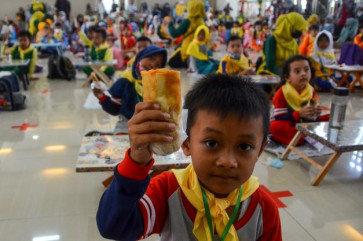Popular Reads
Top Results
Can't find what you're looking for?
View all search resultsPopular Reads
Top Results
Can't find what you're looking for?
View all search resultsLet’s promote STEM education from early age
Indonesia only produced eight STEM-related field graduates per 10,000 people.
Change text size
Gift Premium Articles
to Anyone
T
his month, I took part as a jury in a national science competition organized by a leading private school in Jakarta. Participants of the science-based contest, kids aged 4-5 years old, were asked to send in videos of their experiments in color and water to showcase how science works.
The competition has convinced me Indonesia should not fall short of scientists in the future.
Science is a part of Science, Technology, Engineering and Mathematics (STEM)-based learning, a relatively new concept in Indonesia’s K-12 education system. Many developed countries, such as the United States, the United Kingdom and China, have incorporated STEM education into their educational program since the 1990s, including their early childhood education curriculum.
Almost 30 years later, the Indonesian Education, Culture, Research and Technology Ministry embedded STEM into its early childhood education approach with the addition of the Art discipline, making it STEAM-based learning.
Experts believe that STEM education is the answer to many real-world problems, as students learn to apply science, technology, engineering and mathematics in schools, communities and daily life to meet the demand of the future workforce globally.
STEM is often referred to as the key to the jobs of the future. Our young generation is not gearing up to work in conventional jobs anymore; they are getting ready to be future software engineers, app developers and innovators.
A recent study conducted by Monash University’s Sarika Kewalramani revealed that early childhood is the ideal time to introduce STEM-based play. In the pilot study, children’s creative thinking skills were challenged using simple-battery operated toys and teachers were equipped with iPad-controlled robots as the basis for a lesson on engineering and electronics. The evidence suggested that instead of waiting for primary years, STEM skills need to be fostered from early years, as today’s young children are tomorrow’s workforce.



















